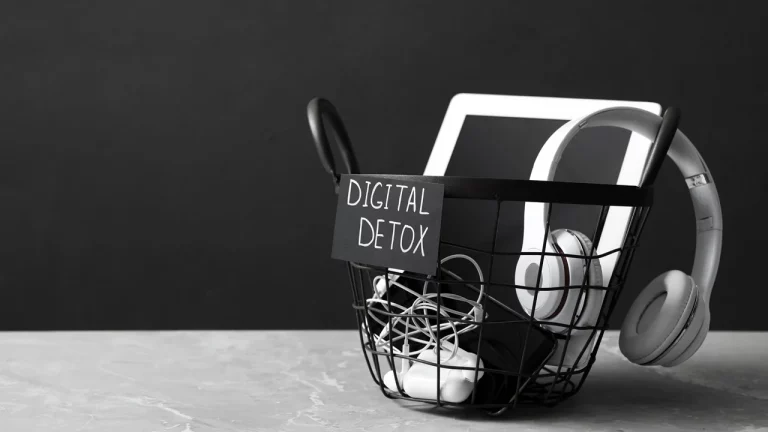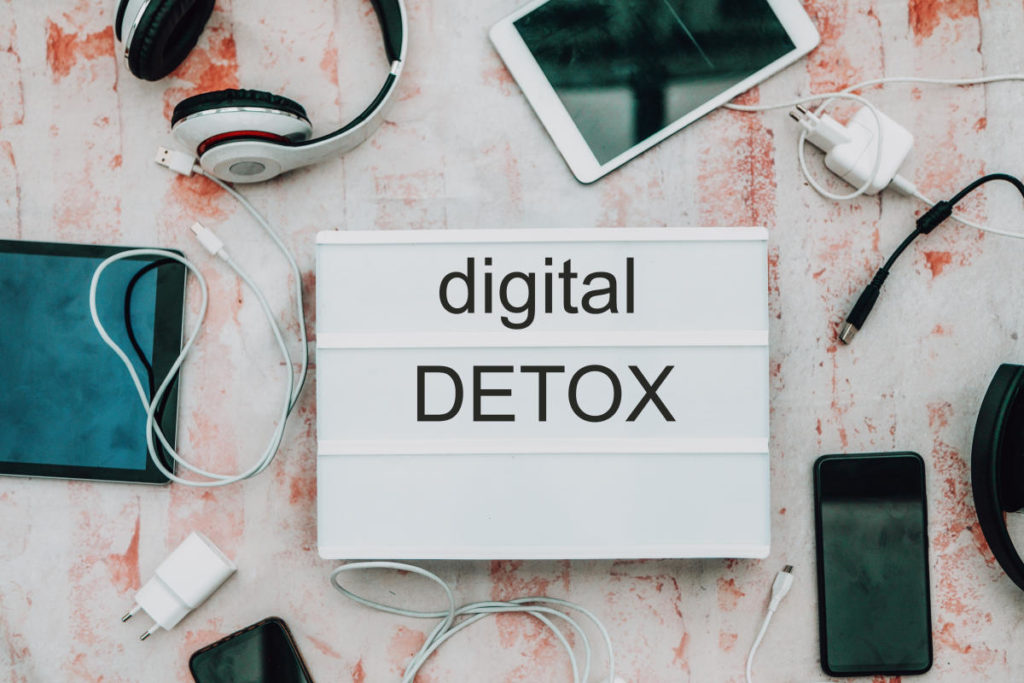- General
- Updated on July 8, 2025
Digital Detox: How to Reclaim Your Time and Mental Space

Introduction
In today’s hyperconnected world, our digital devices have become indispensable tools. We use them for work, communication, entertainment, and even self-care. But with constant notifications, endless scrolling, and screen time creeping into every part of our day, it’s easy to feel mentally overloaded and emotionally drained. That’s where a digital detox for mental health comes in—a conscious break from technology to regain focus, reduce stress, and reconnect with the world beyond the screen.
In this blog, we’ll explore what a digital detox is, the signs that you might need one, the benefits it can offer, and practical strategies to start reclaiming your time and mental space.
What Is a Digital Detox?
A digital detox for mental health is a conscious, purposeful decision to step back from digital devices such as smartphones, laptops, tablets, and televisions for a specific period of time. In an era where constant connectivity has become the norm, this practice offers a valuable opportunity to rebalance your relationship with technology. The aim isn’t to reject digital tools altogether—after all, they play an essential role in modern life—but to pause and reassess how, when, and why we use them.
This temporary disconnection is meant to reduce digital overstimulation and help you reconnect with more meaningful, present-moment experiences. It can help break unhealthy habits like compulsive scrolling, multitasking across screens, or constantly checking for updates that don’t require immediate attention.
A digital detox doesn’t have to be extreme or inconvenient. For some, it might mean turning off push notifications, silencing group chats, or limiting screen time after 8 p.m. For others, it could involve a full weekend—or even a week—completely offline, spent in nature, with loved ones, or in quiet reflection.
The core idea is simple: by reducing screen exposure, you create space for clearer thinking, better sleep, deeper focus, and more meaningful personal interactions. It’s a gentle reminder that technology should serve your life—not consume it.
Signs You Might Need a Digital Detox
Not sure if you need a break from screens? Here are some red flags that suggest it might be time:
- You check your phone within minutes of waking up.
- You feel anxious when your phone isn’t nearby.
- You scroll aimlessly through social media without purpose.
- Your sleep is disrupted or your mind feels overstimulated at night.
- You struggle to focus on one task without switching tabs or apps.
- You feel mentally exhausted despite doing very little physically.
- You find it hard to be present with people in real life.
If any of these sound familiar, it might be time to hit pause and give your brain the rest it deserves.
The Mental and Physical Benefits of a Digital Detox

1. Improved Focus and Mental Clarity
When you remove the constant digital noise, your brain has room to breathe. People who take regular breaks from screens often report better concentration, increased creativity, and improved decision-making.
2. Better Sleep Quality
Blue light from screens suppresses melatonin, the hormone that regulates sleep. A detox—especially before bedtime—can lead to more restful, uninterrupted sleep.
3. Reduced Stress and Anxiety
Constant exposure to news, social comparison on social media, and digital multitasking can elevate stress levels. A detox helps reset your nervous system and promotes a calmer mental state.
4. Less Eye Strain and Physical Discomfort
Digital eye strain (also known as “computer vision syndrome”) can cause headaches, blurred vision, and neck or shoulder pain. Unplugging even for a few hours a day gives your body a much-needed break.
5. Stronger Real-Life Connections
Spending less time on your phone means more time for meaningful conversations and shared experiences with loved ones.
How to Start Your Digital Detox
You don’t need to throw your phone into the ocean to start feeling better. Here’s how to ease into a digital detox in a way that’s manageable and effective:
1. Set Clear Intentions
Ask yourself: What am I hoping to gain from this detox? Whether it’s better sleep, less anxiety, or more presence with family, having a goal will keep you motivated.
2. Create No-Tech Zones
Designate areas in your home where screens are off-limits—like the bedroom, dining table, or bathroom. This helps reduce unconscious scrolling and creates space for mindful habits.
3. Schedule Screen-Free Time
Block off specific hours each day where you intentionally unplug. Start small—like 30 minutes before bed or the first hour after waking—and increase as you feel more comfortable.
4. Turn Off Non-Essential Notifications
Constant pings and buzzes hijack your attention. Turn off notifications for non-essential apps and check them only at designated times.
5. Replace Digital Habits with Offline Activities
Give your hands and mind something else to do:
- Read a physical book
- Take a walk without your phone
- Journal or sketch
- Cook a new recipe
- Do a puzzle or listen to music
6. Use Tech to Fight Tech (Ironically, Yes)
Install apps that track your screen time or temporarily block distracting websites and apps. Examples include Freedom, OffTime, Forest, or Screen Time (built into iPhones).
7. Take a Social Media Break
Even a 1–2 day break from platforms like Instagram, TikTok, or Twitter can significantly reduce mental clutter and self-comparison.
Make It a Regular Practice
A digital detox doesn’t have to be a one-time event. In fact, it’s most effective when practiced consistently—even in short bursts. Try building mini detoxes into your weekly routine:
- “Phone-Free Fridays”: Spend one evening a week fully unplugged.
- “Silent Mornings”: Don’t check your phone until after your morning routine.
- “Digital Sabbaths”: Go screen-free one full day each weekend.
Over time, these small habits can lead to big mental and emotional benefits.
Also Read: How to Spot Online Scams in India: A Simple Guide
Final Thoughts
Technology isn’t the enemy—it’s how we use it that makes the difference. A digital detox for mental health isn’t about rejecting modern life; it’s about reclaiming control over your attention, your energy, and your time. In a world that’s always online, choosing to unplug is an act of self-respect and self-preservation.
Even a short break can give your mind the clarity it needs to refocus, your body the rest it deserves, and your relationships the presence they crave. So go ahead—silence your phone, shut your laptop, and let your mind rediscover what it means to truly be present.
Join the discussion
Related Articles
No results available
ResetTrending Articles


- General
- Updated on August 28, 2025


- General
- Updated on August 29, 2025


- General
- Updated on August 21, 2025


- General
- Updated on August 19, 2025


- General
- Updated on August 16, 2025


- Health
- Updated on August 12, 2025


- General
- Updated on August 22, 2025


- General
- Updated on August 19, 2025


- General
- Updated on August 8, 2025


- Tourism
- Updated on August 6, 2025
No results available
Reset


